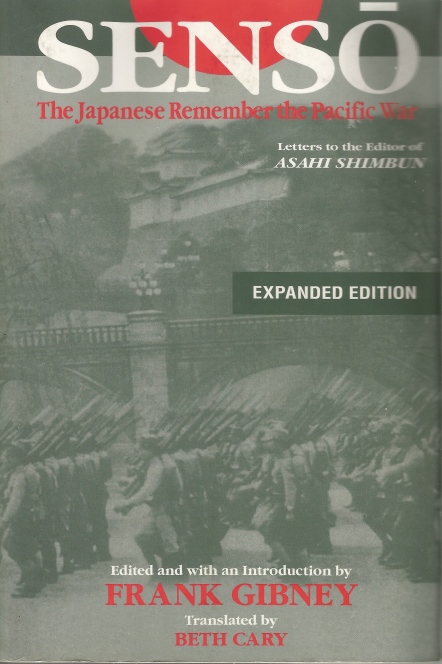
Senso

This is a book where various Japanese people remember World War II. It covers the time leading up to the war on through the occupation of Japan after the war ended. The letters were obtain by the Ashai newspaper in response to a request for such things from their readers. About half the responses were from men who had been in the military at that time and confirm some of the worst things that the Japanese had done to others.
This is one of the books that can get to be rather graphic so be warned.
The book talks about how criticism of the war in Japan was squelched and how, after the war, those responsible for many of the most vicious things were never really punished. It also goes into the history of how the Japanese people ended up either supporting the war or just keeping their mouths shut. A lot of this came from how the right-wingers managed to get the educational system to toe their line.
One interesting letter is a person talking about how the average Japanese person at the time didn't doubt government policies, were not given adequate and/or truthful information, how they were made to feel superior to other races and how important the Emperor was. This is a theme that comes across in other letters, also.
Another letter talks about how Japanese soldiers were brought up under a brutal military system and how this affected their behavior towards others during the war. Also, people who criticized the war could be considered as outsiders by other Japanese and this would put them into considerable difficulties. Again, the brutality the soldiers had to endure from their military superiors is the object of other letters.
One letter refers to how British and Americans were considered to be savages that ate raw meat and had mouths dripping with blood.
Very specific atrocities are discussed, ranging from a small number of Chinese being forced into a tank so the Japanese could test how effective a new anti-tank weapon was right on up to atrocities that involved large numbers of people.
One letter refers to how some soldiers were told to find soldiers that were woman-like in appearance so they could be dressed up, infiltrate American lines and kill American soldiers.
Another letter talks about how Japanese soldiers were brought up to believe that the Chinese they were fighting were subhumans. The same letter charges that the Rape of Nanking was not a spontaneous action but one that was part of a planned program of terror.
Some letters also address the issue of germ warfare and experiments on human bodies that were carried out by Unit 731. Then there's letters that deal with the Burma railroad and the atrocities that went on during its construction.
A whole chapter is devoted to the home front and why people did not speak out or act out against what the Japanese military was doing. One of the most important topics in this section is how the civilians were brainwashed into making bamboo spears and how they were to kill the Americans when they invaded Japan itself. This is something that would have caused a lot of casualties on both sides and probably, at least in my opinion, further inflamed American opinion against the Japanese. Training for the bamboo spears even went on in schools. Again, more than one letter refers to this training.
There's material on how the Japanese newspapers were forced to toe the government news line.
Around 1,500,000 Japanese soldiers were killed in action along with around 500,000 sailors. Around 600,000 Japanese civilians died in the war. 1.3 million Japanese soldiers were put into Soviet camps after the war and, of these, about 300,000 died there.
One important thing to consider is this; there are some in Japan today that downplay what really bad things the Japanese soldiers did. Sometimes they even deny such things even happened. Yet the book has letters from soldiers who were there and engaged in such activities. Now, either those letter writers are all lying and the right-wing in Japan is telling the truth, or the soldiers who wrote the letters are telling the truth and the right-wingers are denying reality.
Personally, I think the right-wingers are in the denying reality group.
Main Index
Japan main page
Japanese-American Internment Camps index page
Japan and World War II index page
Back to start of Japanese history section
|